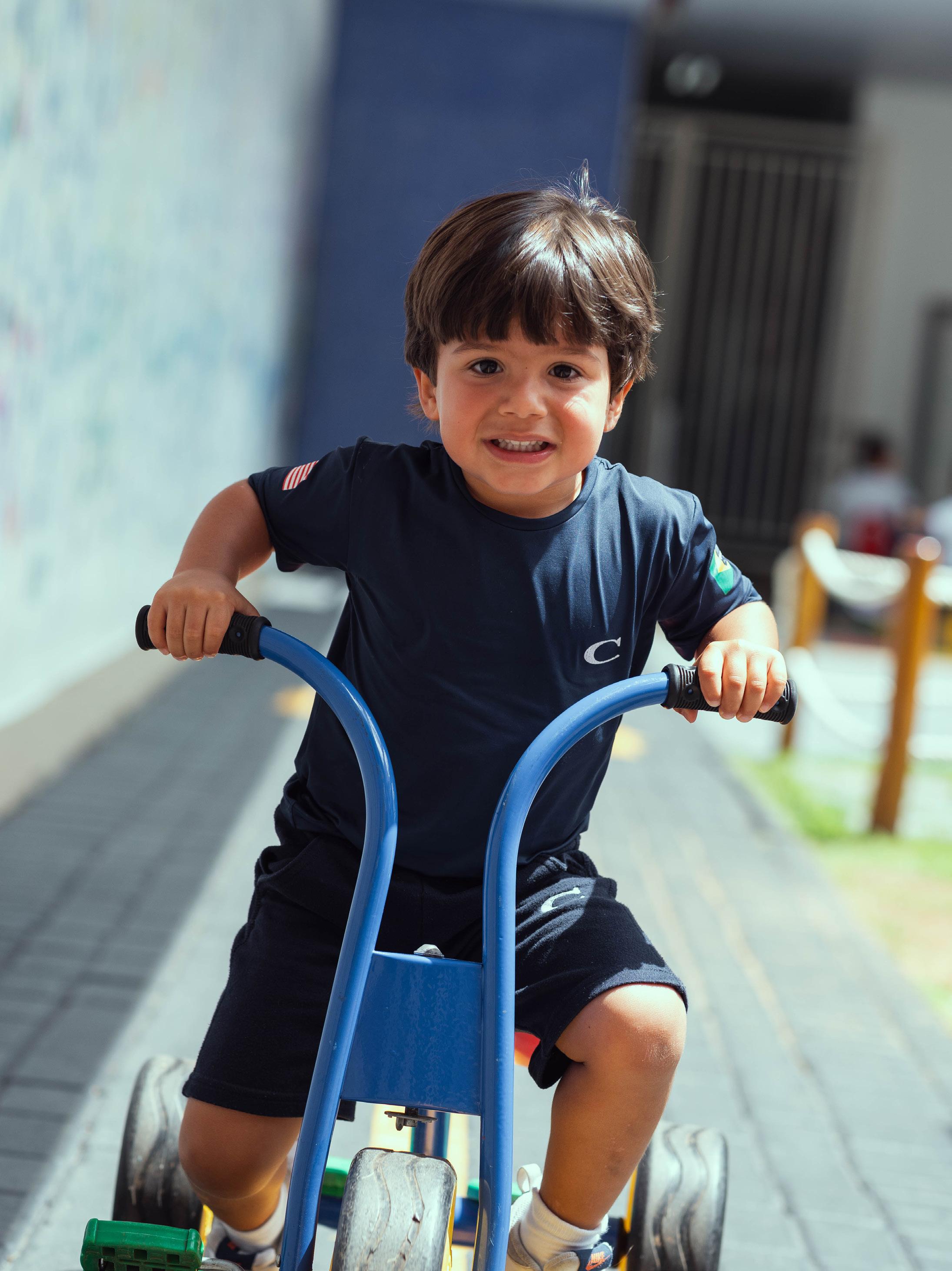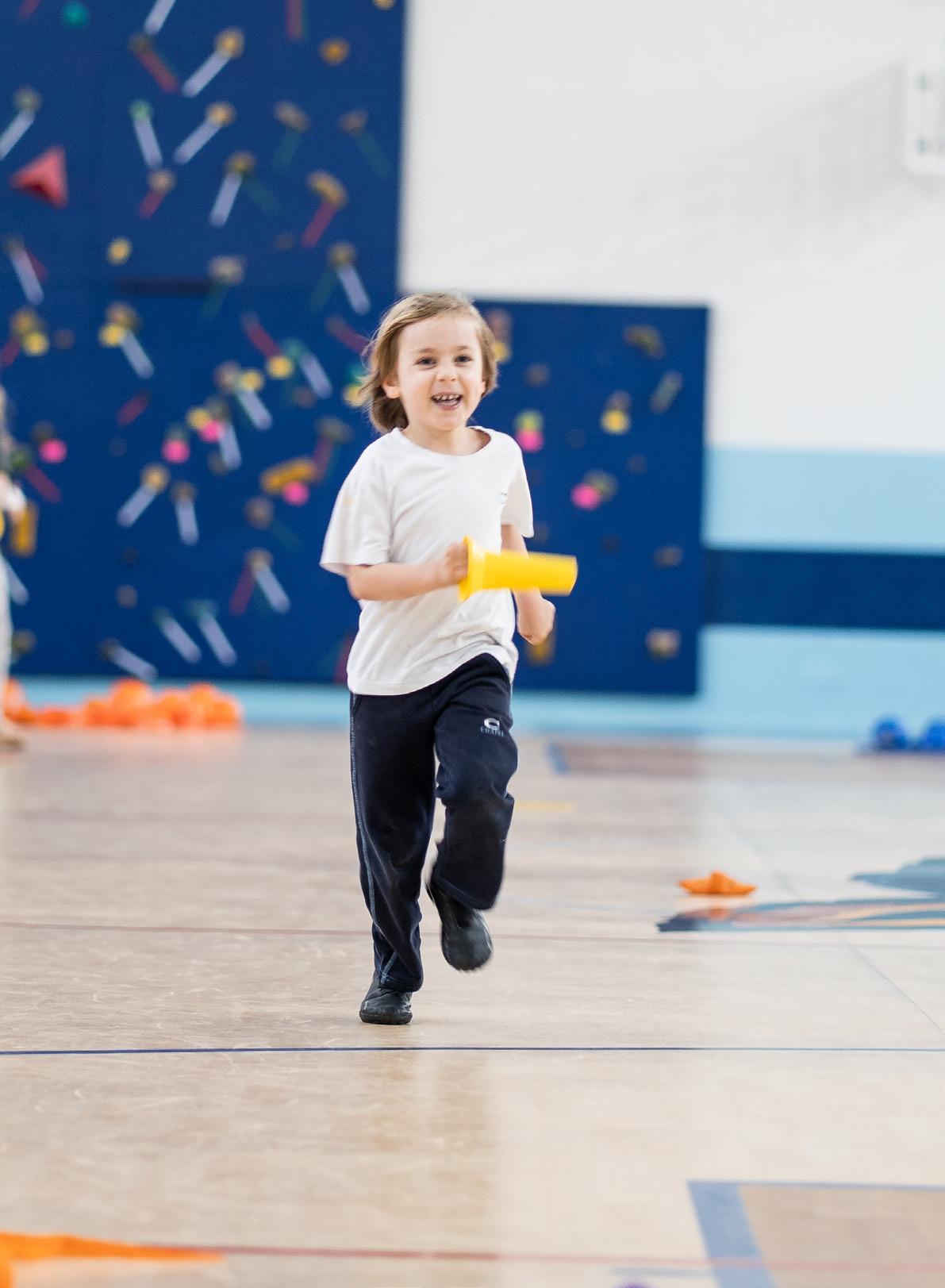







Early Childhood Education experiences are milestones in a child’s and their family’s life. During this phase, children should be free to observe, imitate, create, and explore. Through affection and experiences, children learn to be creative, cooperative, responsible, take risks, and develop empathy for others. Stimulation, development, and improvement of these skills provide a solid foundation for children to be active, happy, and successful adults.
Chapel School is committed to providing its students with a rich learning environment in its Early Childhood Education Center (ECEC), which serves children aged 3 to 5 in Pre I, Pre II, and Kindergarten. In an exclusive and carefully designed space for each age group, our spacious terraced classrooms are well-ventilated, have natural light, and are equipped with a full kitchen and a bathroom with independent bathroom stalls. Our classrooms also have shelves filled with educational materials and toys organized by areas of knowledge –mathematics, sciences, social studies, and language – allowing for moments of exploration and freedom of choice. Students have full-time access to a bilingual teacher and a teaching assistant, and each classroom accommodates at most 16 students in Pre I or 18 students in Pre II and Kindergarten.
Only by seeing each child as a unique individual, can we ensure that each individual’s pace is respected when learning and that everyone has the opportunity to solidify their understanding of the world around them. Within Chapel’s community, all adults are responsible for protecting children and working towards their well-being.
Our academic calendar follows the Northern Hemisphere, starting in August and ending in mid-June, with two vacation periods: June/July and December/January. Students are in school full-time, with classes and activities running from 8 a.m. to 3:10 p.m. Breaks for morning snack, lunch, and afternoon snack – all provided by Chapel’s Food Service - vary by age group. Starting in Pre II, optional extracurricular activities in sports run from 3:20 p.m. to 4:20 p.m. and vary according to students’ age and interest.

The ECEC’s pedagogical guidelines are rooted in social interaction and play, which lead to creativity, a sense of belonging, and learning. Social interaction and play are strongly linked to cognitive competence, with a few of the direct benefits of this approach being self-regulation, memory development, divergent thinking, problem-solving, language development, and knowledge of specific content.
The curriculum of each of the Early Childhood years helps children develop lifelong confidence, creativity, and critical thinking skills by exploring interdisciplinary studies that include language, mathematics, social studies, sciences, music, arts, and physical education activities. When the child starts Pre I, they are immersed in English, the school’s official language. From Pre II to Kindergarten, students have two weekly classes exploring Brazilian culture, taught in Portuguese to develop oral language skills. English literacy starts in Pre II, and Portuguese literacy begins in the first grade of Elementary School.
The pedagogical approach is based on Responsive Classroom - RC - which treats children’s emotional development as being as important as their academic performance and translates into an understanding that prioritizes the development of autonomy and self-assertion. This approach is carried out through daily RC morning meetings in which children are active participants. These meetings foster a strong sense of community, allowing for social and academic development. Every morning, classes gather for morning prayer, followed by a greeting, a sharing activity, a group activity, and a morning message guiding children through their daily routine. In Pre II, the Caring and Sharing meetings begin with Pre II and Kindergarten students meeting weekly in mixed-age groups to develop socio-emotional skills more systematically. In Caring and Sharing meetings, topics such as feelings, conflict resolution, responsibility, cooperation, empathy, and assertiveness are discussed through sessions where children are encouraged to express their ideas, listen, and respect different points of view, as well as ask questions and delve deeper into the content they are learning.
A typical day at Chapel’s ECEC is filled with routines that support students’ development, including their socio-emotional, cognitive, and physical well-being. The morning begins with a warm welcome, followed by teaching practices in which children learn by exploring, doing, and sharing.
Chapel’s team uses research-based teaching strategies to support student learning. We invest significantly in training to provide developmentally appropriate practices for all our students. This means that special attention is given to personalized and differentiated teaching so each student is met where they are in their development and learning process. When visiting an Early Childhood classroom, you can see students in Learning Areas, Guided Reading groups, small groups, or lessons with the entire class.
In the physical realm, care is also taken with how children eat and move. Chapel’s nutrition department meticulously prepares nutritious and diverse meals to teach children to enjoy various flavors. Recess has both free and structured activities that have been carefully thought through to provide opportunities for developing and refining motor skills, balance, and other fine and gross motor skills. Physically active children are more likely to take risks, explore their environment, and be creative.

At Chapel, achieving independence is one of the main goals in Early Childhood Education. From an early age, students are encouraged to feed themselves, handle their personal items such as toys and materials, and, most importantly, learn how to take care of themselves. This quest for independence guides academics, which allows students to become protagonists of their own learning. Based on international early childhood learning standards, the Early Childhood Education curriculum focuses on the holistic development of the child. At the beginning of each academic year, parents receive a Curriculum Overview to track their child’s learning at school.
The developmental and learning parameters adopted by Chapel’s Early Childhood Education are based on Gold Standards, a system that allows for a comprehensive assessment of the child’s development starting at birth, considering the expected milestones in each age group. Gold highlights the expectations for each age group regarding knowledge acquisition, skills, and behaviors while recognizing that the development of young children is not uniform, changes rapidly, and that both growth and learning are interconnected and overlap. The system has been structured around objectives based on children’s neurological and biological development and organized in 10 areas: socio-emotional, physical, language, cognition, literacy, mathematics, science and technology, social studies, arts, and English language acquisition. Thus, Gold is used to guide and differentiate teaching, collect evidence of learning, and report on children’s progress.
The Being a Writer Program starts in Kindergarten. Through collaborative practices, children listen to stories and discuss what makes a good piece of writing. They share their thoughts, listen to others deliver their thoughts, and then are introduced to writing conventions suited to their level of understanding. Children develop socially and academically as they build their knowledge and love for reading and writing.
In the ECEC, starting in Pre I, we use the Everyday Math program. Mathematical concepts are taught through playful and engaging hands-on experiences using real-life examples, games, and other tools. Through essential problem-solving processing skills, reasoning, communication, connection, and representation, children learn mathematical content and develop logical reasoning skills. They also engage in daily math routines, including counting the calendar days, organizing and presenting the day’s program, filling in the weather chart, and taking roll-calls.
Musical education at Chapel is rooted in a learning philosophy where students can develop their musical skills by exploring (music) elements and movements. Children have several opportunities to learn about music history and enjoy different genres, composers, musicians, and performers.
Visual arts education is based on elements such as line, color, texture, value, shape, and space. During classes, students are exposed to different techniques and materials that allow them to create projects in various mediums (painting, sculpture, drawing, and collage). Additionally, the Chapel Art Collection and the Chapel Art Show provide further enrichment. The school’s art collection allows students to appreciate and learn from the art surrounding them. During the Chapel Art Show, students participate in guided tours and workshops suitable for their age group.
Technology is part of students’ and teachers’ daily lives, and from an early age, children learn about the pros and cons of media and social networks. Chapel has been certified by Common Sense Media. Starting in Kindergarten, children explore the computer by engaging in educational games aligned with the curriculum. Additionally, each classroom teacher uses an interactive whiteboard during instruction. A set of iPads is also available to all Early Childhood Education students, and the devices are used to support language differentiation, literacy, and mathematics.
In Early Childhood Education, recreational activities and exercises, whether free or guided, are carefully planned to provide children with opportunities to develop their fine and gross motor skills. Physical education classes engage children in self-awareness activities, through which they learn to identify and take pride in their physical capabilities and feel confident when playing collaborative games with peers.
Chapel’s goal is to instruct individuals to achieve their full potential. In addition to academic, physical, socio-emotional, and psychological formation, a spiritual experience is also promoted for students and faculty. In Early Childhood Education, as they explore the areas of Scriptures, Doctrine, Spirituality, and Community through Bible stories and songs, students learn to respect life, share, and take care of each other.
At Chapel, learning is not restricted to classrooms; it also occurs during field trips and study tours starting in Pre I, with varying durations and different goals for each grade and respecting the socio-emotional development stage of each age group. Every field experience is designed to expand interdisciplinary learning beyond what happens in the classroom, encouraging students to produce tangible and meaningful results that connect to the content learned. Pre I students carry out a half-day field trip near school. Pre II and Kindergarten students have day trips to learning environments in the city of São Paulo or its surroundings. Field trips are always preceded by written parent authorization and aligned with the students’ ongoing studies, to consolidate what has been initially learned in the classroom.



Chapel maintains two libraries for students, with resources to enrich teaching and learning. The libraries are modern, airy, and cozy. The Elementary School library has a collection of 10,500 books in English and Portuguese. The library also maintains premium subscriptions to databases and books such as Ebsco Explora Primary and TumbleBooks . These resources offer children’s books in English in an e-book format with animations, activities, and games. Similarly, in Portuguese, there is a database geared towards reading called Árvore de Livros , which includes 3rd and 4th-grade students. National and international newspapers are offered in print and digital format, including the children’s newspaper Joca , with individual subscriptions for 5th and 6th-grade students.
Other attractions of the Elementary School library are video games as well as board games. Students from 1st and 2nd grades participate in storytelling sessions, and all grades periodically receive visits from writers and perform activities related to reading. The library also holds a Makerspace and a place for lectures or exhibitions, in addition to traditional library activities. Every year, the library team organizes the Book Fair and the International Book Day Celebration, with literary activities aimed at all grade levels and offering national and imported books at cost.
Elementary School students visit the library regularly to choose books categorized by the Lexile System. The Lexile System indicates the level of English comprehension required for reading each book. Parents are always welcome to borrow books to read at home with their children.
Chapel School’s PTA collaborates closely with our Educational Leadership to enhance events and sports activities in alignment with the current school year calendar. Additionally, they collaborate closely with our Athletic Director to ensure the Booster Snackbar operates seamlessly during JV and Varsity home games, serving students and families.
It’s important to note that while the PTA plays a vital role in enriching our school experience, it does not engage in the daily operations or management, be it academic or administrative, which falls under the school’s leadership. We sincerely appreciate the invaluable contributions of all PTA volunteers who generously donate their time and efforts. Although they forego compensation, they have a tremendous positive impact on our school community.
The classrooms are equipped with multimedia projectors, digital whiteboards, and integrated sound systems, creating a dynamic learning environment. Students can access over 400 devices, including laptops, Chromebooks, and iPads, all connected through a high-speed wireless network. These devices are housed in specialized areas such as the Innovation Hub, Makerspace, Technology Lab, and multiple Moving Labs, integrating technology into classroom instruction.
Chapel School’s modern infrastructure is situated on a spacious and green campus that covers more than 40,000 square meters, including a constructed area that exceeds 13,000 square meters. Facilities include an official-sized football field, a sports gym, a climbing wall, a covered multi-sport court, a tennis court, a workout gym, a multi-purpose auditorium with a capacity for 784 people, conference and video conference rooms, a chapel for student liturgical activities and celebrations and Sunday mass, the infirmary, three Science labs, an Integrated Science room, two art studios (one integrated with the environment), a music room, two libraries, three playgrounds for different age groups, a cafeteria for students, teachers, and staff, and female and male changing rooms in the sports gym. The school also has an artesian well and a power generator.
Chapel is located on a highly safe campus with only one entrance and one exit. School buses and vans that transport students have access to school grounds, and all students board and disembark within the school’s campus. Cameras and security personnel monitor buildings 24/7, following strict access protocols. Windows in all classrooms have been treated with bulletproof film.



Is Chapel an international school?
What characterizes an international school?
Chapel is an International American school in Brazil. Its official language is English, and the only subjects taught in Portuguese in Elementary School are Portuguese (language) and Brazilian Social Studies (BSS). In high school, students can take French and Spanish electives. Students follow both Brazilian and American curricula and start the IB curriculum in the 11th grade. Chapel follows the calendar of the Northern Hemisphere: the school year begins in August and ends in June of the following year. Students can receive up to three diplomas when they graduate from High School: American, Brazilian, and International Baccalaureate (IB).
Is Chapel recognized as an American school?
Chapel was founded in the 1940s as a parish school for children of American families living in São Paulo. As such, it has always been an American school in Brazil. Since then, its activities have expanded, and today Chapel offers three diplomas - American, Brazilian, and International Baccalaureate (IB) - which are valid from Early Childhood Education to High School. The curriculum and pedagogical approach have been structured to prepare students for university and life, whether in Brazil, the United States, Europe, or anywhere in the world.
Accredited by NEASC (The New England Association of Schools and Colleges), the oldest agency in the United States and one of the most rigorous in the world, Chapel is recognized as a community of excellence in learning that embraces and respects internationalism, multiculturalism, and local cultures.
What are the requirements for my child to be admitted to Chapel?
To enroll in Chapel’s Early Childhood Education, the child must be the appropriate age for the grade, be toilet trained, and be ready to spend seven hours a day at school. The child’s readiness is assessed through a trial class in a predetermined equipped space, where the pedagogical team observes and gathers information.
What to bring in the backpack on the first day of school?
In addition to the diary, which is the main form of communication between the school and the family, on the first day, the backpack should have a change of clothes and shoes and a specific kit requested of the families in advance. This kit stays in the child’s personal drawer in the classroom and is sent home biweekly for cleaning. Items such as bottles, diapers, pacifiers, or comfort items should not be sent in the backpack.
How many classrooms are there for each grade? What is the number of students per class?
In ECEC, there are three Pre I classes (each with a maximum of 16 students), three Pre II classes (with up to 18 students each), and three Kindergarten classes (with up to 18 students each). Each class has a fullfitted kitchen and guest bathroom with two independent stalls. Each class has a teacher and a full-time assistant.

Classroom assignment is a complex process. Chapel takes the child’s overall development into account to form balanced classrooms. During this process, a team studies and observes students’ academic, social, behavioral, and emotional needs, nationality, their primary language, and other factors to create equitable classrooms. Students are placed in groups that will allow them to develop their socioemotional skills, where they will be academically challenged every day. Chapel is committed to following this assignment closely, while keeping students’ best interests in mind and vying for the best learning environment for their development. At Chapel, when assigning students to a group, parents’ requests for specific teachers and/or friends of their children will not be honored.
Every day after lunch, children rest for an average of 45 minutes. It is a moment of relaxation, energy replenishment, and self-regulation that allows them to digest their lunch and prepare for the afternoon activities. The surroundings are prepared for relaxation: each child is on their mat, lights are dimmed, curtains are closed, soft music is played, and silent activities such as book reading are offered. If they want to or need to, children can sleep undisturbed during this time.
Early Childhood Education students go to the playground twice daily, for about 30 minutes in the morning and again in the afternoon. At all times, whether during free play or planned activities, Responsive Classroom practices are in place to continuously promote socio-emotional development.
There is a structured adaptation program for children entering Pre I. Since it is the first school experience for most students, the initial weeks are dedicated to adaptation and community building in the classroom. On the first day, children arrive at school later, parents go into the classroom with their children, and specific activities are given so adults can interact with the children. As children become accustomed to the new people and environment, parents gradually spend longer periods away. From Pre II onward, there is no formal adaptation procedure, and each child is assisted according to their needs. If necessary, the Chapel team arranges for parents to stay nearby for short periods of time and will immediately contact them should their child need to be picked up earlier in the first days of school.
What does a child learn in preschool?
At Chapel’s Early Childhood Education, children develop holistically as human beings and are prepared for life. They gain independence and autonomy, experiencing these skills in and out of school, and with self-care, which the child carries with them forever. Learning is comprehensive; the child initially learns to recognize themselves in the small classroom community, then in the larger community, and ultimately in the world. At Chapel, socio-emotional development is as important as academic performance, so early childhood education is the time when the child learns how to feel safe/secure, take risks, and explore ideas without the fear of making mistakes.
At what time can I drop off my child at Chapel? Until what time can they stay at school?
Students can arrive starting at 7:35 a.m. and are welcomed by teachers and assistants. Pre I students, and students in other grades who are not enrolled in extracurricular activities, must be picked up at departure time

which is 3:10 p.m. From Pre II onwards, if they want to and if they are enrolled in extracurricular activities, students can stay (at school) until these activities finish at 4:20 p.m.
How are the academic year and school vacations structured? Because it is an American school, Chapel follows the calendar of the Northern Hemisphere: the school year begins in August and ends in June of the following year. There are two vacation periods: June/July and December/January. Chapel observes the Brazilian holidays.
Is it possible to enroll mid-year?
Yes, you can enroll at any time during the school year, subject to availability and approval through the admission process.

Mission Statement
In a caring and academically challenging environment, Chapel provides an American-style education to an international student body. Through Christian values, students learn to make informed decisions, to own responsibility for personal actions and community needs, and to respect life and cultural diversity.
Shared Vision Statement
Engage. Challenge. Support. Care. Prepare students for life.
Motto
“Faith in Education.”
Definition of High-Quality Learning
“At Chapel School, learning is a collaborative and personal journey, crafted to suit the needs and strengths of each student. Rooted in research-based best practices and grounded in international and national curricula, our approach to learning encompasses a holistic view of student growth.
Learning extends beyond academic knowledge. It embraces the spiritual, socioemotional, cognitive, and physical dimensions of student development. Our learning process nurtures life skills while fostering critical and creative thinking, communication, and collaboration.
By cultivating a sense of responsibility and belonging, we empower our students to become active contributors to their communities. Learning has a higher purpose to positively impact society”.
Definition of Internationalism
“Chapel School is an accepting and inclusive environment that respects and embraces cultural uniqueness and diversity. We seek to create an open-minded community while making connections between different perspectives, beliefs, and nationalities to promote a sustainable future in all its dimensions.”

